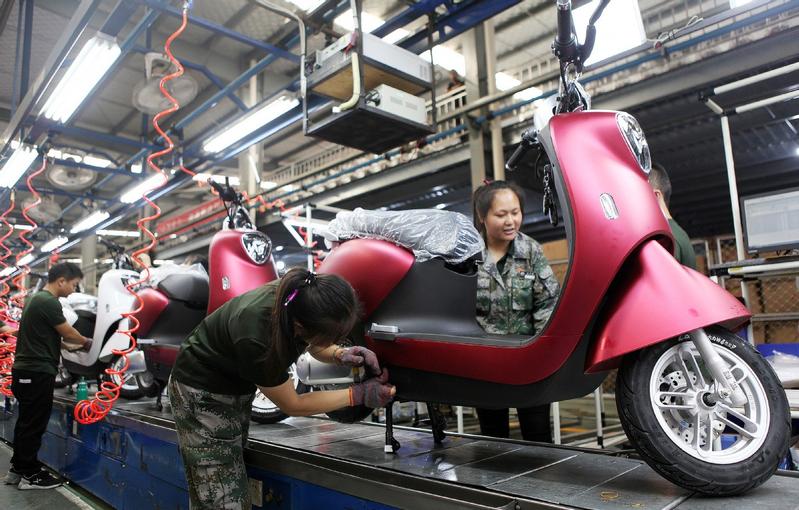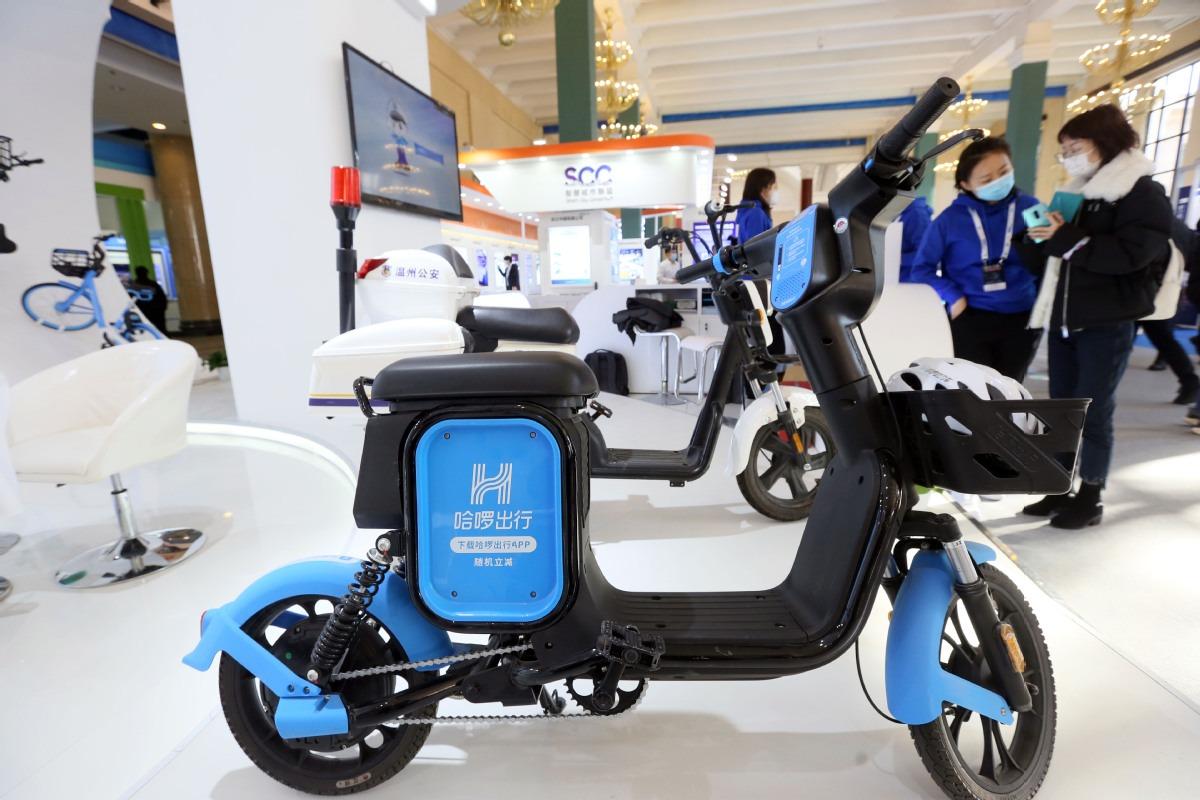 This undated photo shows workers assembling electric scooters at a Yadea Group factory in Chongqing. (CHEN SHICHUAN / FOR CHINA DAILY)
This undated photo shows workers assembling electric scooters at a Yadea Group factory in Chongqing. (CHEN SHICHUAN / FOR CHINA DAILY)
It is not the half-million yuan (US$77,332) price tag that keeps Beijing resident Qiao Ziyi from buying her dream car. Being in a license plate lottery pool for over six years, she is still competing with another 3.8 million people for a chance.
But while awaiting results, reality has come home to roost for Qiao and her family.
"My parents have to send my daughter to school every day and my husband and I have to get to the subway station that is around 3 kilometers away from our home," she said.
"Three to 5 kilometers is an awkward distance for us. It is a little bit of a long walk but it is not cost-effective to call a taxi, especially during bad weather conditions," the 41-year-old product manager said.
China's annual sales of e-scooters exceeded 30 million units last year and the total ownership of such scooters was close to 300 million by last year's end, according to the China Bicycle Association
It was not until recently that she found an ideal way of solving the problem by buying an electric scooter, which allows her to move about more freely.
In China, a rising number of commuters are investing in their long-term daily transportation demand by buying e-scooters, making this massive market further skyrocket to new highs.
According to the China Bicycle Association, e-scooter sales hit 104.6 billion yuan last year. The country's annual sales of e-scooters exceeded 30 million units last year and the total ownership of such scooters was close to 300 million by last year's end.
ALSO READ: COVID-19 gives mainland electric scooter company a boost
Nevertheless, China has become the world's largest producer and exporter of e-scooters and is responsible for more than 90 percent of the production and sales of the e-bikes.
"Two-wheeled electric vehicles, which are usually priced about 3,000 yuan on average, are also affordable for me," said Tan Xin, a 24-year-old university student from Beijing. "Interestingly, when there are traffic jams during morning peaks, the small e-scooters make me feel it's all worthwhile."
Wei Ting, a researcher at the Qianzhan Research Institute, said that the country's e-scooter industry has grown from scratch to the world's largest over the past two decades, as such bikes witnessed increasing innovations in design and performance.
"The e-scooter market has become highly market-oriented and competitive and manufacturers in the field have seen great improvements in scale, profitability as well as competitiveness," Wei said.
In 2019, China started to implement new national standards for e-scooters, requiring qualified products to have pedal functions and speeds cannot surpass 25 kilometers per hour.
The new standards also stipulated that the bike's weight, including its battery, cannot exceed 55 kilograms and motor power and battery voltage should not exceed 400 watts and 48 volts, respectively.
READ MORE: Beijing puts brakes on electric bikes
Industry insiders said that the new standards not only improve the safety performance of e-scooters, but also demonstrate the country's determination to develop new energy vehicles.
China aims to become a self-reliant powerhouse in the new energy vehicle sector over the next 15 years, complete with competitive technologies, strong brands and world-class quality.
At the same time, the country made its pledge to peak carbon emissions by 2030 and achieve carbon neutrality by 2060. The ambitious target was set after China quickly recovered from the economic effects of the COVID-19 pandemic.
It is also in line with the proposals for drafting the 14th Five-Year Plan (2021-25), which recommended policy push to boost spending in emerging sectors, including NEVs, in the coming years.
"Benefiting from these policies, the market for e-scooters will continue to grow in the future. Also, with the new standards coming out, a large number of two-wheelers should be improved," Wei said.
 In this undated photo, a visitor (right) checks out e-scooters at Hellobike's booth during the sixth China Smart City Expo held in Beijing in December 2020. (PHOTO PROVIDED TO CHINA DAILY)
In this undated photo, a visitor (right) checks out e-scooters at Hellobike's booth during the sixth China Smart City Expo held in Beijing in December 2020. (PHOTO PROVIDED TO CHINA DAILY)
It is expected that between 2021 and 2025, 200 million e-scooters will be replaced with models that meet the new national standards. In addition, it is anticipated that the country will see 20 million new unit sales each year.
Currently, more than 700 domestic e-scooter companies with production licenses are competing in the market. Traditional players including Yadea Technology Group Co, Aimatech and Sunra enjoy large market shares.
Yadea has its electric scooter power system equipped with an integrated side-mounted motor and large capacity soft pack lithium battery. Such technology enables the vehicle to accelerate from 0 to 50 km/h in 5.5 seconds and reach top speeds of 80 km/h.
The company has also committed to engineering leading technology. In 2020, the company had a library of 1,097 patents and six industry-leading research and development centers.
The e-scooter market has become highly market-oriented and competitive and manufacturers in the field have seen great improvements in scale, profitability as well as competitiveness.
Wei Ting, Researcher, Qianzhan Research Institute
Niu Technologies, another leading company, upped the ante for the e-scooter market by attracting rising young and high-end consumers with its fashionable designs and sound performance.
ALSO READ: TAILG shrugs off trade row, eyes e-vehicle exports
Leading tech giants also joined the shared e-scooter or electric-powered vehicle business. Bike-sharing company Mobike launched electric-powered vehicles as early as July 2018.
Prior to that, Didi Chuxing promoted shared electric bicycles in Hangzhou, Zhejiang province, and Hello-Chuxing also received considerable per-capita orders for electric-powered vehicles.
Industry insiders said that the unexpected pandemic has also boosted cycling. During the lockdowns, a surge in demand led to bicycle shortages as bicycle shops-which were allowed to remain open-quickly sold out of stock on Tmall, the e-commerce website said.
"For many customers, e-bikes are a great option for the new coronavirus-era way of living. The dramatic increase in sales shows that nationally, people are looking to shift how they get around," said an iResearch analyst who did not disclose his name in a report.
The report showed that in terms of consumer groups, the majority of e-scooter consumers are those aged between 30 and 39, accounting for 47 percent, followed by those aged between 40 and 49.
Electric bicycles and e-scooters have now become important tools for deliverymen and rural residents with the rapid development of the nation's online takeaway market
As urbanization accelerates, the improvement of agricultural industrialization and the continuous rise in farmers' consumption levels, such bikes have also become an important choice for rural residents, according to the report.
Electric bicycles and e-scooters have now become important tools for deliverymen and rural residents with the rapid development of the nation's online takeaway market.
READ MORE: China's E-bike output on fast growth track
"There are about 600 million rural residents whose transportation needs total 4 million kilometers. Such a big user group should be the next important market driver for small cars and low-speed electric vehicles," said Fu Yuwu, honorary chairman of the China Society of Automotive Engineers.
Fu said that demand will continue, especially when the supporting facilities of the country's rural roads transformation are still being developed.
As sales of two-wheeled electric vehicles continue to boom in the country, consumers are also raising concerns about safety, as several accidents-including fire and road accidents-recently happened due to improper use of such vehicles.
CITIC Securities also noted in a research report that the infrastructure supporting two-wheeled electric vehicles still needs to be improved and there is a growing trend wherein companies are engaging in price wars, which is not beneficial for the sustainable long-term development of the sector.


